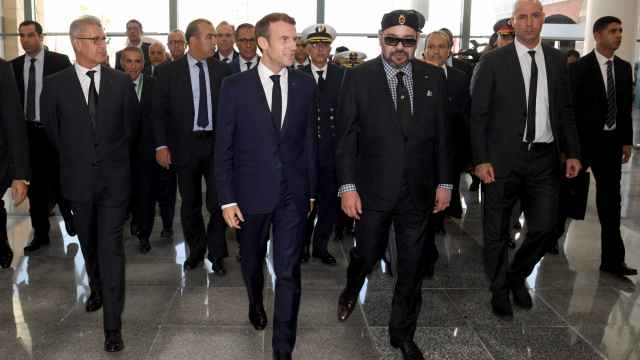It is still unclear whether U.S. citizen Paul Whelan was indeed, as the Russian authorities allege, a spy, or whether he is the victim of mistaken identity or cynical state hostage-taking. Nonetheless, the danger is that we are sliding into an era when civilians become pawns in the game of modern statecraft.
On the face of it, Whelan seems an unusual choice for an agent. A former U.S. marine, dishonorably discharged, he had been visiting Russia since 2007 and was active on Russian social media. Between that and his role as his company’s head of security, he was hardly inconspicuous. What’s more, the CIA is loath to send operatives under “non-official cover” without diplomatic immunity into such a hostile environment as Russia, where counter-intelligence is effective and the authorities intolerant.
It is not entirely impossible, if the information was truly top priority, especially given that the CIA’s official-cover team in Russia would have been gutted by the recent round of tit-for-tat expulsions. But it is easier to believe he was simply picked as a handy victim, or fell foul of a security apparatus prone to professional paranoia and a degree of mirror-imaging. Moscow certainly uses a variety of non-official covers for intelligence agents, so it might presume that Whelan, eager to cultivate Russian friends, was a spy.
Of course, it is hard not to presume that there is a connection with Maria Butina’s case. She was charged neither with outright espionage nor simple unauthorized lobbying but under “espionage lite,” Section 951. This targets “agents of foreign governments,” defined as those who agree “to operate within the United States subject to the direction or control of a foreign government or official” — a very broad definition.
Tit-for-tat arrests with an eye for future prisoner swaps have long been part of Russian intelligence community practice. Spies, after all, have a strong code of getting their people back.
What is less usual, though, is Moscow’s relative reticence. Usually, within 24 hours, spook-friendly television channels would be showing footage of balaclava-masked FSB officers making the arrest. There would be photos of the flash drive Whelan was meant to have received. The Foreign Ministry would be issuing pious condemnations, and it would be the lead news item of the day.
And yet beyond a few routine statements, there has been surprisingly little media attention, especially in the heavyweight government newspapers. Although this is just speculation, in the past silence has denoted a behind-the-scenes disagreement within the government. The FSB is unlikely to have felt the need to canvas opinion across the government before making the arrest, and the two broad factions when it comes to Russia’s relationship with the West each have their own concerns.
One, let’s call it the “World Cup lobby,” wants to encourage tourism, interconnectedness, soft power. Against them is arrayed the "Pyongyang tendency" of those who prioritize security and isolation.
For the former, the case is a problem. They look to Russia’s reputation abroad, and the billions of rubles spent on such soft power ventures as Sochi 2014 and the 2018 World Cup wasted by even a few such incidents.
For the latter, it may be an opportunity. They look at the Kremlin’s reputation at home, and this consolidates their narrative of a hostile world seeking to undermine Russia’s global standing and domestic security.
A swap for Butina would seem to be a good deal to both: a quick resolution so that the story is swept off the news cycle for the former, proof that a tough line brings results for the latter. But assuming that Whelan is innocent, it would further consolidate a worrying trend, making civilians fair game.
It is hardly a new tactic, evident in the recent Chinese arrests of two Canadians after the chief financial officer for Huawei Technologies was detained in Vancouver following a U.S. extradition request. But it is also a chilling one in an age when technology, easy travel and seamless communications would otherwise seem to bring peoples together.
But then again, for the “Pyongyang tendency,” which already sees political threat and cultural homogenization in the spread of foreign values and influences across Russia, that may well be the point.
Mark Galeotti is a senior researcher at the Institute of International Relations Prague and the author of “The Vory: Russia’s Super Mafia.” The views expressed in opinion pieces do not necessarily reflect the editorial position of The Moscow Times.
A Message from The Moscow Times:
Dear readers,
We are facing unprecedented challenges. Russia's Prosecutor General's Office has designated The Moscow Times as an "undesirable" organization, criminalizing our work and putting our staff at risk of prosecution. This follows our earlier unjust labeling as a "foreign agent."
These actions are direct attempts to silence independent journalism in Russia. The authorities claim our work "discredits the decisions of the Russian leadership." We see things differently: we strive to provide accurate, unbiased reporting on Russia.
We, the journalists of The Moscow Times, refuse to be silenced. But to continue our work, we need your help.
Your support, no matter how small, makes a world of difference. If you can, please support us monthly starting from just $2. It's quick to set up, and every contribution makes a significant impact.
By supporting The Moscow Times, you're defending open, independent journalism in the face of repression. Thank you for standing with us.
Remind me later.








